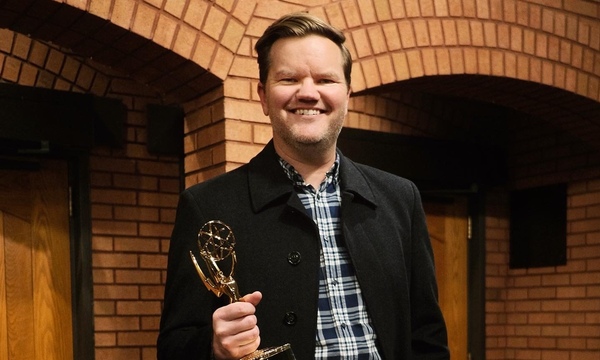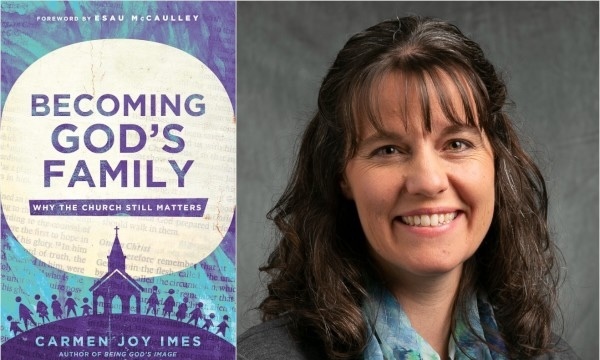Watch President Corey address the racial injustices and George Floyd's death in the video below or read his statement following the video.
Dear Biola community,
This weekend from Florida came the launching of SpaceX, the first astronauts in nine years to be sent from U.S. soil, and what a sign of remarkable progress. As I write, we are hearing of and hoping for news in the near future on a vaccine to eradicate the global pandemic COVID-19, and this will be another sign of remarkable progress.
Yet the last few days we’ve witnessed widespread bewilderment and outrage over the slow progress of people reconciling across ethnic lines, evident in the brutal and senseless death of George Floyd, the latest wound in a long history of racial injustices. We all should feel the pain of these wounds that hurt so deeply so many of our African-American brothers and sisters. They should not be alone in their anger and hurt. All of us should stand with them, and all of us should stand against racism when this sin rears its head.
Today, this is heavy on my heart, and I’m coming to you, Biola community, from the book of Nehemiah looking to what God has to say to me, to us, in this time. In chapter 9 the people of Jerusalem gathered together and wept in repentance, praying for the Lord to heal and restore and reconcile. Read the chapter on your own, all 38 verses, and you’ll see that renewal came about when all the people of God in that city stood together.
This is what the Word of the Lord says in Nehemiah 9, verses 1 through 3 as the large crowds gathered in the city: “They stood together and confessed their sins and the sins of their ancestors. They stood where they were and read from the Scriptures for a quarter of the day, and spent another quarter of the day in confession and in worshiping the Lord their God.” For several hours they read God’s Word out loud, and for the next several hours they confessed their sins and they worshiped together. I think this is a model we need to pursue once we get back to Biola. Reading Scriptures on God’s grace, mercy and justice, and then confessing our sins as we worship together.
Under the authority of Scripture, they repented. Repentance means God’s people grieve over what we have done and not done, over things we have said and what we have not said. We grieve where we have turned the other direction, when we’ve walked away from and not toward those who have been treated unjustly. Repentance means naming the sins we’ve committed that need to be made right and confessing the sin of indifference toward our aching and fearful brothers and sisters.
Not only did they fast together and stand together and read the Word together and confess their sins together, but in verse 2 they acknowledged together the sins of their forefathers. It’s biblical to confess the sins of those who have gone before us, as God’s people in Jerusalem did in Nehemiah chapter 9. In today’s moment, how do we confess the sins of those who have gone before us? I think of those who did not stand with our black brothers and sisters in the 1860s or the 1960s, who stayed quiet or turned the other way. We see in our world how the sin of racism has not been extinguished and how injustices continue toward our brothers and sisters made in God’s image. These verses in Nehemiah tell of how the people of God needed to experience forgiveness for their sins and their need to repent for the sins of the past. Maybe this is a model for how we should repent today.
Nehemiah 9 begins with the people standing together because they had some things to confess to be reconciled to God and to each other.
In the church at large and at Biola as a Christian university, we need to stand together. When people of diverse backgrounds and cultures stand in unity against injustice, genuine Christian solidarity results. We do this not like the unbelievers, but we stand together as sisters and brothers redeemed by the blood of Christ. Sometimes we stand together simply by grieving with those who feel angry or hurt. We do this by mourning with others, by being uncomfortable listening to their pains instead of trying to explain it away or instead of telling them how they should feel or instead of jumping to easy answers. We do this Christian solidarity thing by prayer and intercession, but we also do this by speaking out against the injustices or wrongs our brothers and sisters have endured and how it still impacts them today.
Like the great awakening in Nehemiah chapter 9, this is how we must respond. We need to stand together. We need to commit to being people of the Word. We need to confess together our sins and the sins of our forebears. We need to defend each other. We need to worship together. And we need to know, really know, one another. As we stand together, we also check our own motives and hearts. What do I still need to learn? What do I still need to repent of? For starters, I acknowledge and own the need for the ongoing work on our campus so all students feel welcome and so all students are given every opportunity to flourish.
My office overlooks our chapel, named after Calvary, bearing that symbol of Christ’s sacrifice and reconciliation, the cross. How much we need the redeeming power of the cross today. Calvary Chapel is also where I gathered with some of you, not many months ago, to grieve over prejudices and strife.
It was an evening of honest speaking and humble listening. A few leaders and I sat in a big circle in Calvary Chapel, over 100 of us from diverse backgrounds, to talk about and to hear about each other’s experiences at Biola. Most of these honest and brave stories by my brothers and sisters were hard to hear that night. But I needed to hear them, and I’ve thought of those stories ever since. I hurt hearing their stories, and I was angry that we had allowed this to happen.
In a small way, that night was a Nehemiah 9 moment, as we stood together sharing Scriptures and confessing hurts we’ve felt and hurts we’ve caused and worshiping Jesus. When we gather together around God’s Word, when we confess together our sins, and when we worship together the resurrected Christ, we truly stand together. And when we stand together we will study together, we will share meals together, we work together. Above all, we embody the love of Christ together.
And we do this by taking concrete steps to build bridges and not walls. All Biola students should be comfortable in their own skin, free to be themselves on campus and accepted as a part of our Christian community. No one should feel afraid, unseen, dismissed or less than. No one.
We have made progress, but we have a long way to go. But our plans will not work if our hearts are not aligned, if we do not confess our sin, confess the ways we’ve been indifferent and uncaring to those who genuinely hurt in our community. As a leader on this campus, I need to model this, not just listening and learning but moving toward action. I commit today again to our diversity strategic plan and its concrete steps toward awareness and implementation and change.
As I wrap this up, I am thinking about this past Sunday, Pentecost Sunday, that the Acts 2 believers from different ethnicities were bound by the same Spirit that raised Christ from the dead. Christians worldwide for two millennia on Pentecost Sunday have remembered the early church that gathered together and stood together and prayed together and bore witness to Christ together. It’s time for a return to Pentecost, empowered by the Spirit, when we stand with each other and for each other in the name of Jesus.
Chief Diversity Officer Tamra Malone and her team have posted an article with resources to learn about diversity and living out this Kingdom value during this season.
I look forward to seeing you in the fall, as students, faculty and staff, and living into Nehemiah 9 and Acts 2.
Blessings in Christ,
Barry H. Corey
Read more about Biola's Institutional Strategic Plan.
Biola University is a leading Christ-centered university in Southern California that offers a premier, nationally ranked education and has been named one of the nation's “up and coming” universities by U.S. News & World Report four times in five years. Founded in 1908, Biola is committed to the mission of biblically centered education, scholarship and service — equipping men and women in mind and character to impact the world for the Lord Jesus Christ. With more than 6,300 students at its Los Angeles-area campus and around the world, the university offers more than 150 academic programs through its nine schools, ranging from the B.A. to the Ph.D. For more information, visitwww.biola.edu.
 Biola University
Biola University
.jpg)

